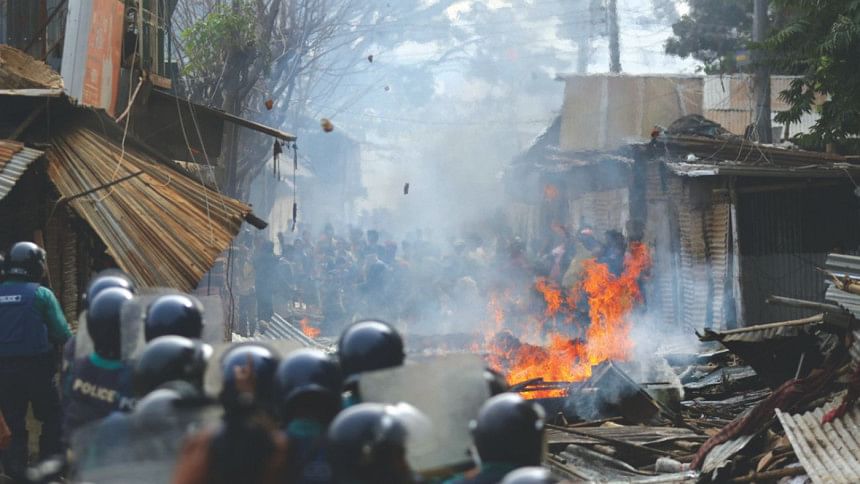Whose city is it, anyway?

The impassioned descriptions all collide against, but dissolve into each other – the past, present and future, stories of pain, aspiration, fear and anger compete against each other to be heard. It seems an inappropriate time to say: "One at a time, please."
"They bulldozed our homes right in front of our eyes…"
"Nodi bhanga manush amra (we lost our homes to river erosion); now we're fighting not nature but the government…"
"It was a pile of garbage when we made our home here; we cleared it off with our own bare hands..."
"They threw tear gas, rubber bullets and hot water on us, we ran for cover…"
"I was born here, grew up here… 30 years worth of memories and possessions gone in a blink of an eye…"
"See where the bullet hit me…"
"And they call us land grabbers… the nerve of them…"
"What now…?"
We stand talking in the ruins of Sayeeda Begum's dwelling in Kalyanpur Pora Bosti, surrounded by three generations of her family members. Nothing remains of the life she has built, against all odds, over the past 30 years, except for broken bricks, corrugated iron, and a lone blanket to protect her and her four-year-old grand-daughter from the biting cold under the open skies [of unequal growth and unapologetic development]. Last Thursday, the authorities demolished the homes of hundreds of families in the name of "removing illegal structures," without sufficient notice or any prior plan of rehabilitation, and in violation of successive stay orders from the High Court. Four out of 10 blocks of the slum were razed to the ground by the police and local goons, who came fully armed with state-sanctioned weapons of mass suppression: bulldozers, tear gas, and rubber bullets.
The slum-dwellers say that they were given insufficient notice of the eviction drive. On Tuesday, January 19, five of them were picked up by 30-35 policemen and taken to the police station. They were locked up in a cell until 5pm, when the OC met them and laid down his terms: they would have to leave the slum within two days or suffer irreparable loss. They were given no chance of negotiation.
Well before the 48 hours was over, hundreds of police and armed cadres arrived to clear off the area. The slum dwellers were not to be so easily defeated, however: they had organised and blocked off the entrance through which the bulldozers were to pass. Upon meeting resistance on multiple fronts, the police, in characteristic style, swooped upon the masses, no-holds-barred. "We put a fight for as long as we could, but we fell before the tear gas," exclaims Bibi Rokeya, a vegetable seller who has lived here for the last 22 years. "They had no care that there were children, elderly and disabled people in the slum, who couldn't run and hide when they were throwing the gas at us, beating us…"
Unfortunately for the powers-that-be, which had grand plans, no doubt, to "develop" the vast area of land displacing over 20,000 landless people, the eviction drive had to be suspended because of an injunction from the High Court obtained that very day. The court also instructed officials not to evict or harass the slum-dwellers without proceeding through legal channels.
The hearing of the petition took place at roughly the same time that the eviction drive began. Notably, even though the HC order was issued around 12.30 pm, and notices served instantly to concerned authorities, the drive continued for another 4-5 hours. The authorities claimed they were not informed of the injunction – a dubious excuse in "Digital Bangladesh" where we have multiple platforms of communication and news outlets transmitting the "breaking news" within a few minutes of an event!
Can we not argue that the uninterrupted raid of the authorities for five hours after the HC order was made public constitutes contempt of court? Furthermore, the eviction drive itself could be considered "illegal" as there had been multiple court orders already in place to stay the operation of eviction of allegedly illegal establishments in Kalyanpur till the case was resolved in the court. Can we not ask why the police -- if it were really there to uphold the rule of law -- did not stop the authorities who were violating the explicit orders of the judiciary?
The matter did not end there. The next day, a "mysterious" fire broke out in the slum, wiping out at least 21 shanties and stalls and damaging many more. The locals are unwilling to accept it as a mere coincidence; they are convinced that it was ruling party cadres who set the shanties on fire in a desperate bid to free up the lands, from which they are all set to benefit. Worse still, the cadres allegedly tried to misdirect the fire brigade and stop them from arriving on time, such that they reached the spot a good 1.5 hours after the fire started (it should have taken them no more than 20 minutes). Such utter disregard for human lives is, in editorial terms, condemnable and unacceptable, but not exactly shocking.
Our esteemed authorities, in their haste to defend growth and development, have failed to ask themselves the obvious humane question: where are these people to go? These people whose labour is crucial to the functioning of this city. These people who are driven to the cities as their lands are lost to climate change or to shrimp farmers or budding industrials. These people who, in search of employment and with nothing to lose, have flocked to the city with the naïve dream of a better life. These people who are the inevitable by-products of unequal growth and unplanned urbanisation; the not-so-pleasant side of that ever-so-elusive neoliberal fantasy. Where are these people to find shelter, in this harsh winter, the chills of which we are barely exposed to, in our designer coats and well-insulated homes? Some will not survive the winter (an added bonus in this over-populated city, you policymakers say?); some will take refuge in the streets beside the fancy high-rise buildings till the haughty guards (who might hail from their own villages) kick them off again; they will be pushed further and further yet to the peripheries, to make way for a spatially segregated Dhaka, a fortified enclave for the rich and the middle classes, that can simultaneously disavow the existence of the working class urban poor while rely on their labour (now made even more exploitable) to make their own lives more pleasant.
It's all well and good to be proud of our steady GDP growth and export earnings, of our "successful" implementation of the MDG goals, of our grand plans to develop the nation, of our beautification projects and housing estates, but they mean precious little if we cannot so much as envision, much less ensure, affordable housing and other services for a significant proportion of our urban population. The government, which purports to be pro-poor, must take urgent steps to build housing projects to which evicted slum dwellers can be rehabilitated. They must address the urgent challenges of neoliberal urbanisation in a manner that befits a pro-people state, not a profit-mongering exploitative, multinational. They cannot simply will the problem into disappearing by forcibly throwing people onto the streets, violating the constitutional guarantees to the right to life, basic necessities, equal opportunities and equal protection before the law.
The writer is a journalist and activist.

 For all latest news, follow The Daily Star's Google News channel.
For all latest news, follow The Daily Star's Google News channel. 







Comments